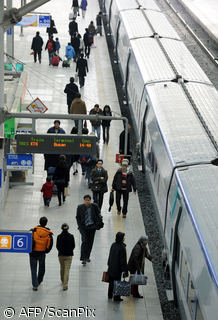Foreign investment flows into Russia plunged to $1.3 billion last year from $20.8 billion in 1998, the Central Bank of Russia reported.
Published:
14 May 2000 y., Sunday
Foreign direct investment rose to $2.9 billion in 1999 from $2.8 billion in the previous year, balance of payments data in the Central Bank's newsletter show. But the outflow of portfolio investment reached $900 million, compared to an increase of $8.3 billion in such foreign investment in 1998.
Foreign loans and credits to the government sector totaled $2.7 billion last year, down from $6.7 billion in 1998. This included $1.3 billion in untied financing: about $1.0 billion in loans from international financial organizations and a loan of $0.3 billion from the Japanese Bank for International Cooperation. Actual government payments on foreign loans and credits totaled $7.2 billion ($5.6 billion on the principle and $1.6 billion in interest), out of the $12.2 billion due; about $3.0 billion in payments were overdue. The proportion of foreign equity ownership in the Russian commercial banking system increased by 70% to 10.7% as of January 1, 2000.
Foreign direct investment into this sector rose to $0.5 billion (including subordinated credits) from an estimated $0.3 billion in 1999.
Last year $11.7 billion in cash foreign currency was brought into Russia (down from $20.7 billion in 1998), including $8.3 billion by the banking system. At the same time, $12.6 billion was taken out of the country ($21.6 billion in 1998), including $5.4 billion through unregistered trade (shuttle traders) and $5.3 billion by tourists. The official foreign currency reserves increased by $1.8 billion in 1999 as a result of operations reflected in the balance of payments.
Šaltinis:
Interfax
Copying, publishing, announcing any information from the News.lt portal without written permission of News.lt editorial office is prohibited.
The most popular articles
 The mission held constructive discussions with Prime Minister Emmanuel Nadingar, Finance Minister Gata Ngoulou, Infrastructure Minister Adoum Younousmi, and other senior officials.
more »
The mission held constructive discussions with Prime Minister Emmanuel Nadingar, Finance Minister Gata Ngoulou, Infrastructure Minister Adoum Younousmi, and other senior officials.
more »
 The EBRD is helping to improve the quality of power supply and stimulate renewable sources of energy in the Caucasus with an €80 million sovereign loan to Georgia for the construction of a new high voltage transmission line - the Black Sea High Voltage line, which will interconnect Georgia and Turkey.
more »
The EBRD is helping to improve the quality of power supply and stimulate renewable sources of energy in the Caucasus with an €80 million sovereign loan to Georgia for the construction of a new high voltage transmission line - the Black Sea High Voltage line, which will interconnect Georgia and Turkey.
more »
 The EBRD is helping to improve the infrastructure of the Georgian capital, Tbilisi, with a €100 million loan for the construction of a new railway route bypassing the city.
more »
The EBRD is helping to improve the infrastructure of the Georgian capital, Tbilisi, with a €100 million loan for the construction of a new railway route bypassing the city.
more »
 One of the men considered to be the founding fathers of the euro currency met MEPs on the Foreign Affairs Committee Tuesday (16 March) to talk about transatlantic relations.
more »
One of the men considered to be the founding fathers of the euro currency met MEPs on the Foreign Affairs Committee Tuesday (16 March) to talk about transatlantic relations.
more »
 European Trade Commissioner Karel De Gucht today opened a conference focused on the European Union's trade policy towards developing countries.
more »
European Trade Commissioner Karel De Gucht today opened a conference focused on the European Union's trade policy towards developing countries.
more »
 At the beginning of the 2000s, state ownership in financial intermediation in Mexico accounted for about 20 percent of the total credit of the banking system, provided through development financial institutions and funds.
more »
At the beginning of the 2000s, state ownership in financial intermediation in Mexico accounted for about 20 percent of the total credit of the banking system, provided through development financial institutions and funds.
more »
 Halving the number of business failures by offering individual support, doubling the number of young people who want to start their own business or raising by 500% the number of enterprising new cooperatives are just some of the projects nominated for the European Enterprise Awards 2010.
more »
Halving the number of business failures by offering individual support, doubling the number of young people who want to start their own business or raising by 500% the number of enterprising new cooperatives are just some of the projects nominated for the European Enterprise Awards 2010.
more »
 The European Commission has published the fourth call for proposals for the creation and upgrade of freight transport services under the second Marco Polo programme.
more »
The European Commission has published the fourth call for proposals for the creation and upgrade of freight transport services under the second Marco Polo programme.
more »
 The European Central Bank (ECB) today announced a programme of technical cooperation with the Central Bank of Bosnia and Herzegovina, in collaboration with a number of euro area national central banks (NCBs).
more »
The European Central Bank (ECB) today announced a programme of technical cooperation with the Central Bank of Bosnia and Herzegovina, in collaboration with a number of euro area national central banks (NCBs).
more »
 The EU disbursed today €1 billion to Romania, the second instalment of a €5 billion loan, which was agreed in May 2009 as part of a multilateral financial assistance package.
more »
The EU disbursed today €1 billion to Romania, the second instalment of a €5 billion loan, which was agreed in May 2009 as part of a multilateral financial assistance package.
more »